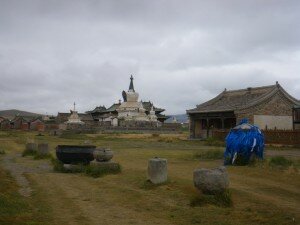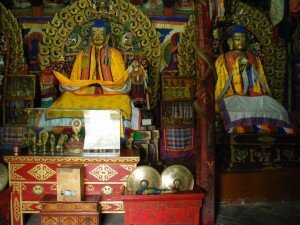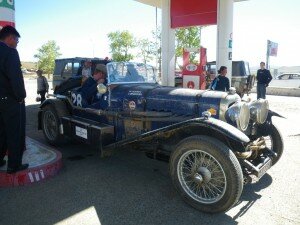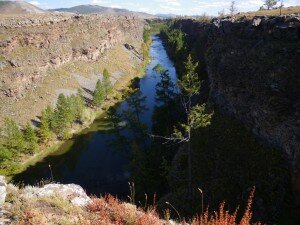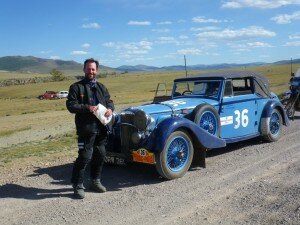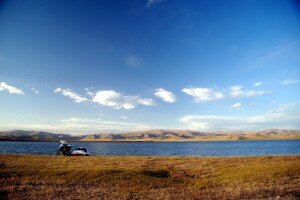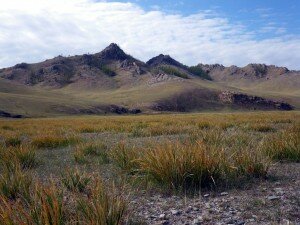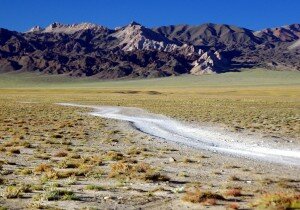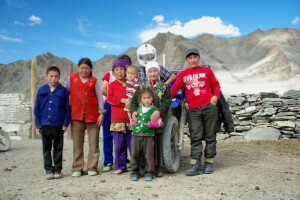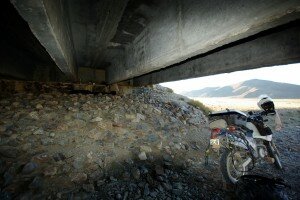I followed a track north toward the aimag capital of Arvayheer with the goal of replenishing food and water for camping. In the smaller villages, the store shelves are stocked with food items with expiration dates that are measured in decades: instant noodles, colas, candy, canned soups and sauces, powdered soup bases, and pasta. I like to have some of that on hand for emergencies, but for day-to-day living I need something with less sodium and preservatives. At the aimag capitals I could find locally made bread, dried fruit, fruit spreads, cured meats.
The road north from Arvayheer took me past Erdene Zuu, site of the oldest surviving Buddhist monastery in Mongolia.
The next day the landscape changed from desert scrub to grassy hills, and I arrived at Tsetserleg, probably the prettiest aimag capital I’ve seen yet. I found the highly-recommended Fairfield guesthouse and set about scrubbing off the grit and funk of my week of Gobi camping.
Gassing up to leave Tsetserleg I came across an unexpected sight.
And later during a rest at a cool volcanic canyon…
…there were more.
I’d been caught up in the dust cloud of the Peking to Paris Rally. Hats off to these folks driving vintage cars (and one 1922 motorcycle) across harsh landscapes, rather than having them languish in garages and museums. I stayed with the pack for a while, but at Tosontsengel veered off onto a more direct track to Ulaangom.
West of Ulaangom, the track climbed a 1200 meter pass and I had my first view of snow-capped peaks.
The elevation eventually climbed again to 2200 meters and outside of Tsagaanuur I was treated to lake and mountain views.
Entering the village of Tsagaanuur I was greeted by a young Mongolian (who identified himself as Kazakh) and invited to his home for tea, bread and cheese. I was delighted by the offer and followed him to a humble house where I met more generations of his family.
We spent about an hour going over maps while granny cut up bread and cheese and kept the hot, milky tea flowing into bowls. Kids came and went, neighbors popped in to see the foreigner, and I practiced a few Kazakh words. I gave them my LP Mongolia guide as a way of thanking them for their hospitality. When I was leaving I wanted to take a picture of the family, but couldn’t find the small camera that had been living in my jacket pocket for nearly two months. Thinking I’d left it at a previous photo stop, I was quickly on my way, backtracking up the road. I noticed that the motorcycle wasn’t running very well, but chalked it up to kids fiddling with fuel taps and choke settings. Soon I realized that my jacket was missing a lot more weight than a digital camera, and on closer searching noticed that I was missing a multi-tool, MP3 player, sunglasses case, and tire pressure gauge. (Later I found more missing from my other luggage: My supply of spare nuts and bolts and laundry soap.) With mounting dread it dawned on me that the pleasant hospitality of the Kazakh family had only been a method of distracting me while my valuables were pilfered. (And as it turns out, my fuel was drained and replaced with some vile liquid that caused the bike to run poorly until I was in Russia, two days later.)
I returned to the house to ask if they’d seen any of the items that had disappeared, but their welcoming smiles were replaced with stony looks and shrugs. This was a no-win situation for me, and they knew it. It was my word against theirs, and they had half a dozen witnesses who could tell the police their version of events. So I rode away on my sputtering bike, feeling violated and instantly suspicious of any friendly overture from the locals. At the magazin I stopped for water and snacks, and found my bike mobbed by rosy-cheeked, giggling kids. One wanted to climb on — what else could I do? — I helped him up to the seat and let him have a view from the captain’s chair for a minute. After starting the bike another young fellow wanted to give the throttle a twist. Sure, why not? The turn of events had me smiling at how my bike brought a little fun to the lives of these kids, but my guts were still churning over the deception and theft that had just happened. I said goodbye to the kids and found a campsite a few kilometers out of town. Tent-flattening wind gusts and impotent fantasies of violent retribution kept me awake through the night.
I still had a day to kill before my Russia visa became valid, so I headed out of town toward Olgii, if only to put distance between myself and the scene of yesterday’s crime. My plans were aborted when the road crossed a river that was a little too deep for comfort. The other roads out of town were back the way I came, and toward the Russian border. The gusting winds had not subsided, and it had gotten colder since last night, so I made it a priority to get out of the wind and brew up hot soup and coffee. About ten kilometers along the road toward Russia I found a bridge for shelter.
I decided to spend the day here, sipping hot liquids and nursing my emotional wounds (a.k.a. feeling sorry for myself), and made a plan to sleep here if the winds didn’t subside. I set up a kitchen area between the concrete supports, and cleared an area for my sleeping pad and bag. I passed time by inspecting the Mongolian graffiti, which included names and dates, declarations of true love, and the expected depictions of the human form with exaggerated body parts. After nightfall the character of my abode changed. The tomb-like silence of the place, being broken only by the rumble of passing traffic and a sprinkle of Soviet-era cement dust, combined with the stink of old concrete and rat droppings, drove me out into the gravel of the dry riverbed. Fortunately the winds subsided and I slept, albeit fitfully, thankful to be under the stars again.
